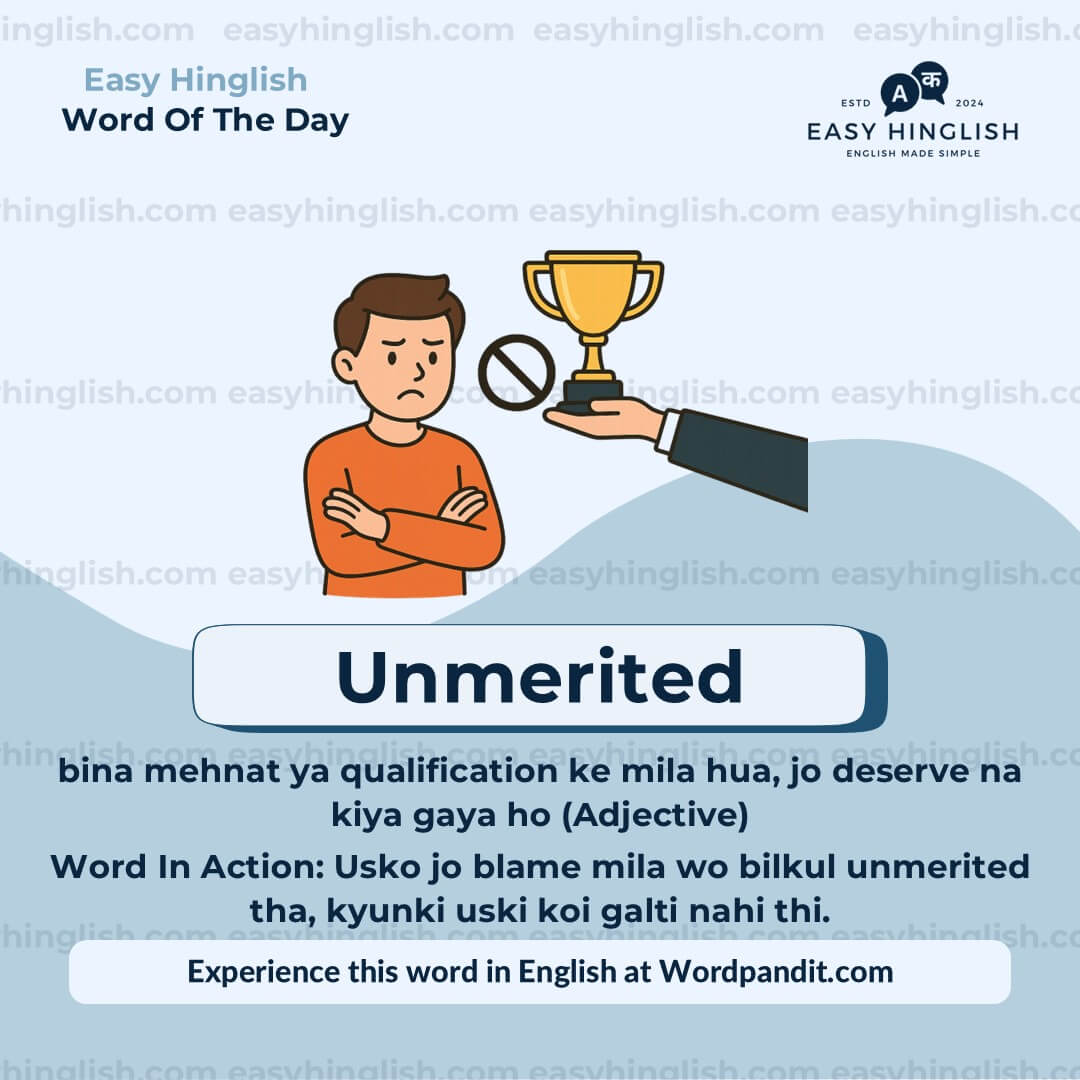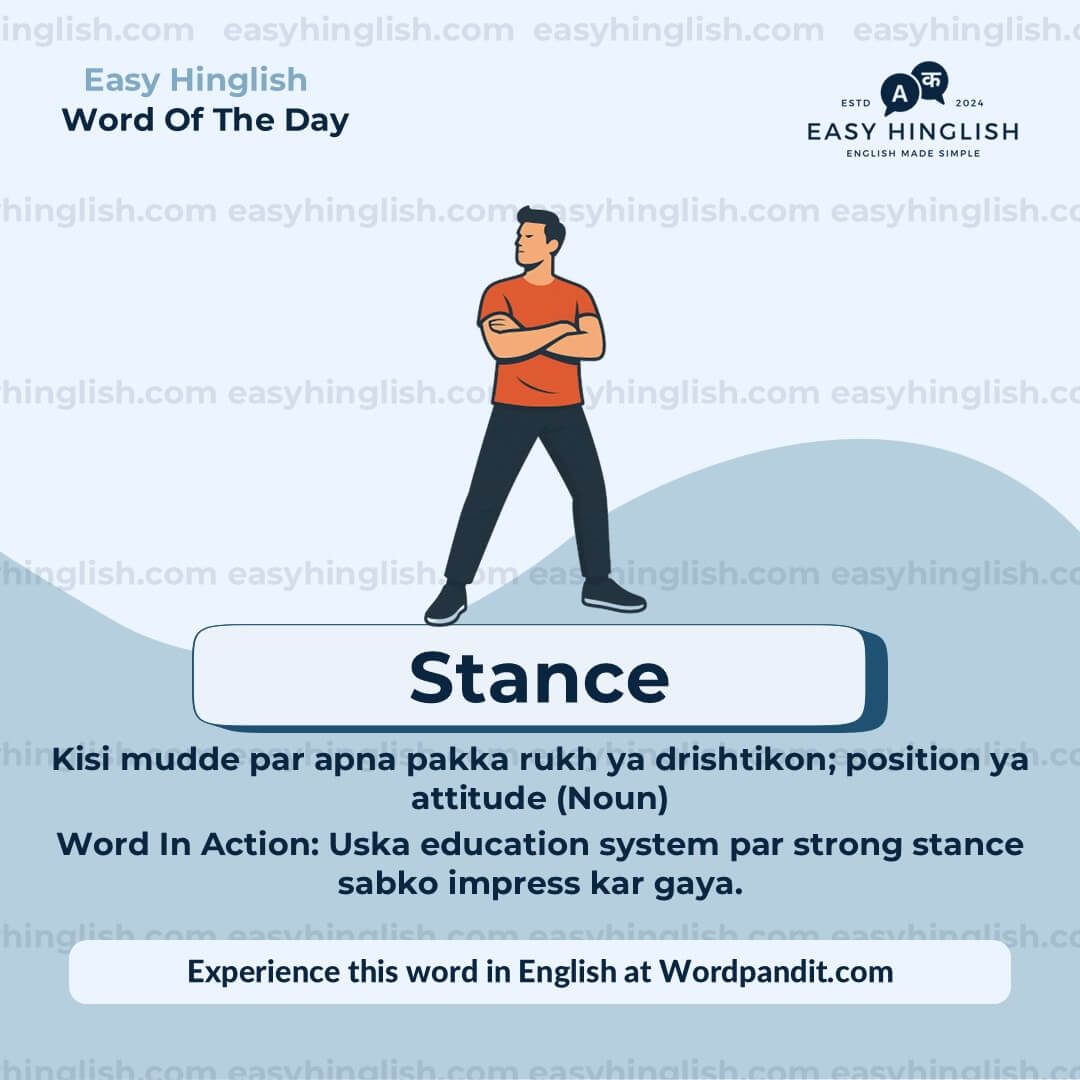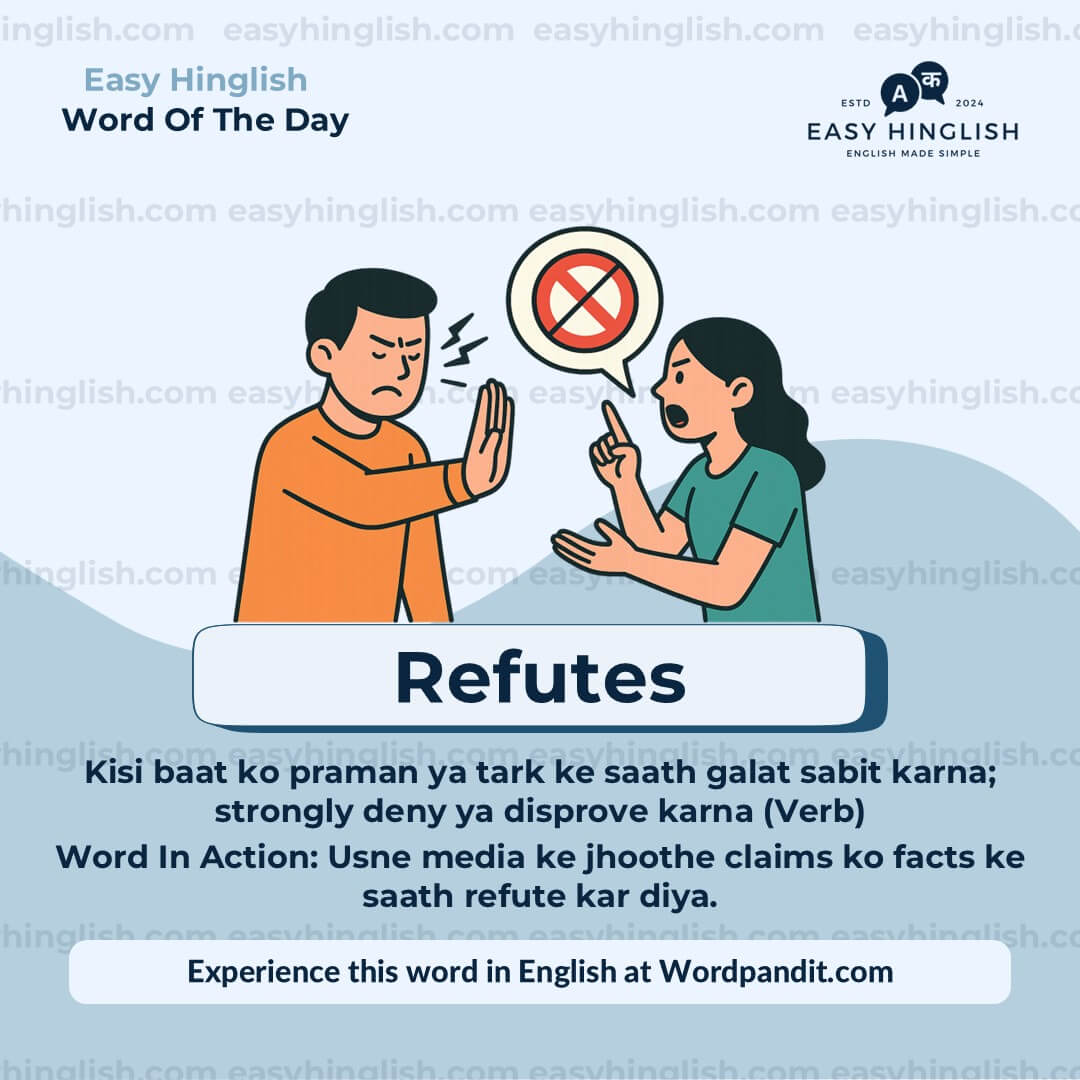Daily Vocabulary International Newspapers aur Publications se Seekho
Wordpandit ke Global Vocabulary Hub ke Saath Apni Vocabulary Expand Karo
Wordpandit par, hum aapko ek truly global vocabulary develop karne me madad karte hain, jo duniya ke sabse respected international publications se li gayi hoti hai. Yeh section aapko naye words se introduce karne ke liye design kiya gaya hai jo global conversations aur trends ko define karte hain.
Global Sources ka Power
Aapko globally sochne aur communicate karne me madad dene ke liye, hum vocabulary curate karte hain world ke top international sources se, jaise:
- The New York Times
- The Washington Post
- BBC
- The Guardian
- The Economist
- Scientific American
- Psychology Today
- Aur bhi bahut saare...
Globally Socho, Competitively Seekho
Hamare daily updates se aap international publications ke naye words seekhoge jo global news aur developments se jude hote hain. Isse aapki vocabulary current bhi rahegi aur globally relevant bhi.
Apni Global Soch Ko Expand Karo
Agar aap international exams ki tayari kar rahe ho, global business communication me excel karna chahte ho, ya sirf apni language skills improve karna chahte ho, toh Wordpandit aapko global level pe grow karne ke liye best resources provide karta hai.
Smart Learning, Global Reach
Hamari learning methodology me global examples, memory aids, aur interactive activities shamil hain, jo naye words ko effectively yaad karne aur real-world me use karne me madad karti hain.
Aaj Hi Apni Global Vocabulary Journey Shuru Karo!
Wordpandit Kyun Choose Karein?
Practical Learning: Aise words seekho jo real-world reading aur communication me aapko sach me kaam aayenge, taaki aapki comprehension aur bolne ki skills improve ho.
Diverse Content: Current affairs se lekar scientific breakthroughs tak, hamare different sources aapko multiple domains ki vocabulary seekhne ka moka dete hain.
Effortless Integration: Wordpandit ko apni daily routine ka part banao. Sirf kuch minute har din dene se aapki vocabulary time ke saath kaafi improve ho sakti hai.
Vocabulary Mastery Tak Ka Aapka Safar
- Regularly hamare Daily Vocabulary section ko visit karo
- Naye words explore karo aur unka context me use samjho
- In words ko apni writing aur bolne ki practice me use karne ki koshish karo
- Jaise-jaise aapke words badhte hain, apni progress ko track karo
Aaj Hi Apni Vocabulary Journey Shuru Karo!
Wordpandit ke saath vocabulary improve karna start karo. Roz thoda effort dalne se aap ek strong vocabulary develop kar sakte ho jo academic, professional, aur personal life me kaafi kaam aayegi.
Yaad rakho, ek naya shabd roz seekhna linguistic limitations ko door karne ka best tareeka hai! Wordpandit ko apni daily learning journey ka sathi banao aur vocabulary excellence ki taraf badho!
WORD-1: Memoir
Sandarbh (Context):
"A posthumous memoir by Virginia Giuffre accuses the Duke of York..." - BBC
Vyakhya (Explanatory Paragraph):
Memoir ka matlab hai kisi vyakti ki apni life ke experiences aur memories ko apne shabdon mein likhna. Yeh word tab use hota hai jab koi famous personality, politician, ya influential person apni personal journey, struggles aur achievements ke baare mein autobiography ke form mein likhte hain. Memoir ka upyog literature, journalism aur competitive exam passages mein hota hai jahan personal narratives aur historical accounts discuss kiye jaate hain. CAT, GRE aur UPSC mein memoir-based passages common hain jo author ke perspective aur personal truth ko explore karte hain.
Arth (Meaning): Apni yaadein aur personal experiences ko likhi hui kitaab, atmakatha ya jeevan-vrittant (Noun)
Uccharan (Pronunciation): MEM-wahr (मेमॉयर)
Kathinai Star (Difficulty Level): ⭐⭐ Basic se Intermediate
Utpatti (Etymology): Memoir French word 'mémoire' se aaya hai jiska matlab hai 'memory ya yaad.' Originally yeh Latin 'memoria' se derived hua jo 'memory' indicate karta tha. 16th century se yeh word literature mein establish ho gaya jab writers apne personal experiences aur historical events ko first-person perspective mein document karne lage.
Prashant Sir Ke Tathya (Prashant Sir's Notes):
Bahut students memoir ko autobiography se confuse karte hain—dono apni life ke baare mein hoti hain, lekin memoir specific period ya theme par focus karti hai jabki autobiography complete life cover karti hai. CAT aur GRE ke RC passages mein memoir excerpts aksar personal reflection aur subjective truth explore karte hain, isliye tone aur perspective identify karna zaroori hai. Memoir ka sahi istemal kaise karein: yeh countable noun hai toh aap "a memoir" ya "memoirs" (plural for collection) bol sakte hain. Indian context mein, political leaders aur freedom fighters ke memoirs competitive exams mein frequently appear hote hain—jaise Nehru ki "Discovery of India" partly memoir hai.
Samanarthi & Vipritarthi (Synonyms & Antonyms):
Samanarthi (Synonyms): autobiography, life story, reminiscences, recollections, personal narrative, account, chronicle, atmakatha, jeevan-vrittant, sansmaran
Vipritarthi (Antonyms): fiction, novel, fantasy, fabrication, imaginative work, kalpana
Udaharan (Usage Examples):
- Michelle Obama ka memoir "Becoming" worldwide bestseller bana aur Indian readers mein bhi kaafi popular hua tha.
- Retired cricketer Virat ne apna memoir publish kiya jisme unhone captaincy ke daur ke emotional struggles share kiye.
- Professor ne students ko assignment diya ki woh kisi freedom fighter ka memoir read karein aur uski historical accuracy analyze karein.
- Dadi aksar kehti thi ki woh apna memoir likhna chahti hain taaki family ke aane wali generations unki Partition ki kahaniyaan jaan sakein.
Sanskritik Sandarbh (Cultural Reference):
"Har insaan ki life ek kahani hai, aur memoir us kahani ka sach hai jo kehne wala apne nazariye se bayaan karta hai." - Common literary wisdom
Sochiye (Think About It):
Agar aapko apna memoir likhna ho toh aap apni life ka konsa period ya theme choose karenge jo sabse zyada meaningful hai?
Chhoti Kriya (Quick Activity):
Kisi famous Indian personality (politician, actor, sportsperson) ka naam sochiye aur imagine kijiye ki unka memoir kaisa hoga—title kya hoga aur do important chapters ke names suggest kijiye.
Yaad Karne Ka Tarika (Memory Tip):
'Memoir' ko aise yaad rakhein: "MEM" matlab "MEMORY" aur "OIR" sounds like "OUR"—toh "MEMORY + OUR" = apni memories ko share karna. Ya phir socho ki "MEM-wahr" mein "mem" (madam) apni "waar" (stories) suna rahi hai.
Vastavik Jeevan Me Upyog (Real-World Application):
Memoir commonly book reviews, literary analysis, aur biographical articles mein use hota hai jab personal narratives discuss kiye jaate hain. Publishing industry mein "memoir" ek distinct genre hai jo autobiography se alag categorize hota hai. Journalism mein, jab koi public figure apni controversial ya significant life events reveal karta hai, toh reporters "memoir" word use karte hain headline aur articles mein. Academic writing mein, memoir extracts primary sources ke roop mein historical aur cultural studies ke liye cite kiye jaate hain.
WORD-2: Prominent
Sandarbh (Context):
"The book... written by the prominent accuser of sex offender Jeffrey Epstein..." - BBC
Vyakhya (Explanatory Paragraph):
Prominent ka matlab hai koi vyakti ya cheez jo bahut famous, important ya easily noticeable ho. Yeh word tab use hota hai jab kisi influential person, well-known figure ya distinctive feature ke baare mein baat karni ho. Prominent kaise use karte hain: newspapers, formal writing aur competitive exam passages mein iska upyog commonly hota hai jab important personalities, leading organizations ya salient features describe karne ho. CAT, GRE aur UPSC mein prominent word frequently appear hota hai context passages mein jahan key figures ya major characteristics identify karne hote hain.
Arth (Meaning): Prasiddh, mahatvapurn ya saamne dikhne wala; famous aur influential (Adjective)
Uccharan (Pronunciation): PROM-ih-nunt (प्रॉमिनन्ट)
Kathinai Star (Difficulty Level): ⭐⭐ Basic se Intermediate
Utpatti (Etymology): Prominent Latin word 'prominere' se aaya hai jiska matlab hai 'jut out ya aage badhna,' jahan 'pro' means 'forward' aur 'minere' means 'to project.' 16th century mein yeh word English mein aaya aur initially physical sense mein use hota tha (kuch jo physically stick out karta ho), lekin gradually iska metaphorical usage develop hua meaning 'distinguished' ya 'conspicuous.' Aaj kal yeh word dono physical aur social prominence ke liye use hota hai.
Prashant Sir Ke Tathya (Prashant Sir's Notes):
Students aksar poochhte hain: prominent aur famous mein kya farak hai? Famous sirf well-known hone ko indicate karta hai, jabki prominent mein importance aur influence ka element bhi hota hai—matlab koi sirf known nahi hai balki respected aur influential bhi hai. Prominent ka sahi istemal kaise karein: yeh adjective hai toh noun ke pehle lagta hai—"a prominent leader," "prominent features" etc. CAT ke RC passages mein jab "prominent" dikhta hai toh notice karo ki author kis cheez ko emphasize kar raha hai—usually woh key players ya important aspects hote hain. Indian newspapers mein aapko "prominent industrialist," "prominent political figure" jaise phrases daily milenge—yeh journalism ka standard vocabulary hai.
Samanarthi & Vipritarthi (Synonyms & Antonyms):
Samanarthi (Synonyms): famous, distinguished, eminent, notable, leading, renowned, influential, well-known, prasiddh, mahatvapurn, jaana-maana
Vipritarthi (Antonyms): obscure, unknown, insignificant, unimportant, minor, anonymous, nameless
Udaharan (Usage Examples):
- Ratan Tata ek prominent industrialist hain jinhone Indian business landscape ko completely transform kar diya hai.
- Delhi ke prominent locations mein property prices itni zyada hain ki middle-class families afford nahi kar sakti.
- Dr. Sharma cardiology mein prominent specialist hain aur patients unse consultation lene ke liye mahino wait karte hain.
- Social media pe ek prominent activist ne government ki nai policy ke against campaign start kiya jo viral ho gaya.
Sanskritik Sandarbh (Cultural Reference):
"Bollywood mein prominent directors ki films opening day pe hi crores kama leti hain, chahe reviews kaise bhi ho." - Common film industry observation
Sochiye (Think About It):
Kya har prominent person automatically respect deserve karta hai, ya prominence aur respectability mein farak hona chahiye?
Chhoti Kriya (Quick Activity):
Apne field ya city ke teen prominent personalities ke naam likhiye aur ek line mein batayiye ki woh kyun prominent hain—unki kaunsi qualities ya achievements ne unhe notable banaya?
Yaad Karne Ka Tarika (Memory Tip):
'Prominent' ko aise yaad rakhein: "PRO-MINENT" matlab "PRO level pe MIND mein aane wala"—jab koi itna famous ho ki turant mind mein aa jaye. Ya phir imagine karo ek mountain ka PROMINENT peak jo sabse upar aur visible hai—wahi concept hai prominence ka.
Vastavik Jeevan Me Upyog (Real-World Application):
Prominent commonly news articles, business reports aur professional communication mein use hota hai jab key figures, important features ya leading entities describe karne ho. Journalism mein "prominent" ek standard descriptor hai political leaders, business tycoons, aur public figures ke liye. Resume aur LinkedIn profiles mein bhi log apne "prominent achievements" ya "prominent projects" mention karte hain apni credibility establish karne ke liye. Academic papers mein "prominent theories" ya "prominent researchers" cite kiye jaate hain authority aur credibility dikhane ke liye.
WORD-3: Unmerited
Sandarbh (Context):
"Smith argued that while unmerited applause can delight a weak person, a wise person seeks to earn it." - The Daily Economy
Vyakhya (Explanatory Paragraph):
Unmerited ka matlab hai 'jo deserve nahi kiya gaya ho, bina mehnat ke mila hua.' Yeh word tab use hota hai jab kisi ko kuch aisa milta hai jo usne actually earn nahi kiya—praise, rewards, ya recognition jo justified nahi hai. Unmerited ko formal writing, opinion pieces aur competitive exam passages mein use karte hain jab undeserved benefits ya unfair advantages ki baat karni ho. CAT aur GRE ke critical reasoning sections mein yeh word aksar ethical arguments aur merit-based systems ko discuss karte waqt dikhta hai.
Arth (Meaning): bina mehnat ya qualification ke mila hua, jo deserve na kiya gaya ho (Adjective)
Uccharan (Pronunciation): un-MARE-ih-tid (अनमेरिटिड)
Kathinai Star (Difficulty Level): ⭐⭐ Basic se Intermediate
Utpatti (Etymology): Unmerited English prefix 'un-' (meaning 'not') aur Latin word 'meritus' se bana hai jiska matlab hai 'deserved' ya 'earned.' Merit ka concept ancient Rome se hai jahan performance-based rewards ka system tha. Aaj bhi yeh word tab use hota hai jab kisi achievement ya benefit ki deservingness par question uthana ho.
Prashant Sir Ke Tathya (Prashant Sir's Notes):
Bahut students 'unmerited' ko 'undeserved' se confuse karte hain—dono similar hain lekin unmerited zyada formal aur literary contexts mein use hota hai. CAT aur GRE ke students ke liye, unmerited aksar ethical reasoning passages mein dikhta hai jahan merit-based systems versus privilege ki discussion hoti hai. Unmerited praise aur unearned privilege mein farak samajhna zaroori hai—pehla specifically recognition ke baare mein hai jabki doosra broader social advantages ko refer karta hai. Indian newspapers mein aapko 'unmerited criticism' ya 'unmerited praise' aksar political commentary mein milega jahan fairness ka sawaal uthaya jata hai.
Samanarthi & Vipritarthi (Synonyms & Antonyms):
Samanarthi (Synonyms): undeserved, unearned, unjustified, unwarranted, gratuitous, bina mehnat ka, nakaabildaari, bina haq ka
Vipritarthi (Antonyms): merited, deserved, earned, justified, warranted, haqdarana
Udaharan (Usage Examples):
- Nepotism ki wajah se bahut log corporate world mein unmerited promotions pa lete hain jabki deserving candidates ignore ho jate hain.
- Priya ko lagta tha ki uske competitor ki award jeet unmerited thi kyunki usne project mein zyada contribution nahi kiya tha.
- Critics ne film ko unmerited hype milne ki baat kahi kyunki marketing budget bahut zyada tha lekin content weak tha.
- Rohit apne unmerited success ke liye family connections ka shukriya ada karta hai, hard work ka nahi—yeh transparency rare hai India mein.
Sanskritik Sandarbh (Cultural Reference):
"Bollywood mein nepotism debate ने 'unmerited opportunities' ka concept mainstream kar diya—jahan star kids ko unearned platforms milte hain jabki talented outsiders struggle karte hain." - Indian film industry discourse
Sochiye (Think About It):
Kya aapne kabhi kisi aise situation mein khud ko paya hai jahan aapko unmerited praise ya criticism mila ho? Isse aapki motivation aur self-perception par kya impact pada?
Chhoti Kriya (Quick Activity):
Apne around teen situations identify karein jahan aapne unmerited praise, criticism, ya advantage dekha ho—school mein, office mein, ya social media par. Ek sentence mein explain karein kyun woh unmerited tha.
Yaad Karne Ka Tarika (Memory Tip):
'Unmerited' ko aise yaad rakhein: 'UN-MERIT-ED'—imagine karo kisi ko medal mil raha hai lekin usne race mein 'UN' (nahi) participate kiya, toh woh MERIT nahi karta medal. Aise hi unmerited kuch bhi wo hai jo bina deserve kiye mil jaye.
Vastavik Jeevan Me Upyog (Real-World Application):
Business communication aur performance reviews mein 'unmerited' useful hai jab unfair advantages ya biased decisions ko professionally point out karna ho. Academic writing mein yeh word social justice, inequality aur privilege ke discussions mein crucial hai. Editorial pieces aur opinion columns mein journalists iska use karte hain jab unearned benefits ya unjustified criticism ko highlight karna ho, especially political aur corporate accountability ke context mein.
WORD-4: Stance
Sandarbh (Context):
"But that stance discounts what many of us had been through..." - BBC
Vyakhya (Explanatory Paragraph):
Stance ka matlab hai kisi particular issue ya topic par apna position, opinion ya attitude. Yeh word tab use hota hai jab kisi ki official stand, viewpoint ya policy ke baare mein baat karni ho. Stance kaise use karte hain: political debates, business discussions aur formal writing mein commonly iska upyog hota hai jab kisi ki position clarify karni ho. CAT, GRE aur UPSC ke passages mein stance identify karna important skill hai kyunki author ki stance samajhne se argument ka analysis asaan ho jata hai.
Arth (Meaning): Kisi mudde par apna pakka rukh ya drishtikon; position ya attitude (Noun)
Uccharan (Pronunciation): STANS (स्टैन्स)
Kathinai Star (Difficulty Level): ⭐⭐ Basic se Intermediate
Utpatti (Etymology): Stance French word 'estance' se aaya hai jiska matlab tha 'standing place' ya 'position,' jo further Italian 'stanza' (room ya stopping place) se connected hai. Originally 16th century mein yeh word physical posture ke liye use hota tha—jaise kisi athlete ya fighter ki body position. Gradually 19th-20th century mein iska metaphorical usage expand hua aur intellectual ya political position indicate karne laga. Aaj stance ka dual meaning hai—physical posture aur metaphorical viewpoint dono.
Prashant Sir Ke Tathya (Prashant Sir's Notes):
Students aksar poochhte hain: stance aur stand mein kya farak hai? Dono similar hain lekin stance zyada formal aur considered position suggest karta hai, jabki stand casual bhi ho sakta hai. CAT aur GRE ke RC passages mein jab "author's stance" identify karna ho toh dhyaan do ki woh neutral hai, supportive hai ya critical—yeh tone questions mein bahut kaam aata hai. Stance ka sahi istemal kaise karein: typically "take a stance," "adopt a stance," ya "maintain a stance" jaise phrases mein use hota hai. Indian political discourse mein aapko daily "government's stance on Kashmir," "party's stance on reservation" jaise expressions milenge—yeh formal policy positions indicate karte hain jo easily change nahi hote.
Samanarthi & Vipritarthi (Synonyms & Antonyms):
Samanarthi (Synonyms): position, viewpoint, standpoint, attitude, stand, perspective, opinion, outlook, approach, rukh, drishtikon
Vipritarthi (Antonyms): neutrality, indifference, ambiguity, uncertainty, tatasttha, nishpaksh
Udaharan (Usage Examples):
- Government ne climate change par apna stance clear kiya hai ki woh renewable energy ko priority degi.
- Company ka official stance yeh hai ki employees ko work-from-home option milna chahiye lekin practically implementation weak hai.
- Debate mein Priya ne feminism par strong stance liya aur traditional viewpoints ko logically challenge kiya.
- India ka international forums mein consistent stance raha hai ki terrorism ke against zero tolerance honi chahiye.
Sanskritik Sandarbh (Cultural Reference):
"Cricket mein captain ka stance sirf batting position nahi, balki team strategy aur match situation ke against uska approach bhi hota hai." - Common sports commentary observation
Sochiye (Think About It):
Kya har controversial issue par clear stance lena zaroori hai, ya kabhi-kabhi neutral rehna bhi ek valid position ho sakta hai?
Chhoti Kriya (Quick Activity):
Kisi current social ya political issue ko choose karein (jaise social media regulation, education policy) aur do opposing stances ko ek-ek line mein summarize karein.
Yaad Karne Ka Tarika (Memory Tip):
'Stance' ko aise yaad rakhein: "STANCE" sounds like "STAND + DANCE"—jab koi dance karta hai toh uska ek particular STANCE hota hai, similarly har issue par apna STAND lena padta hai. Ya phir socho cricket mein batsman ki batting STANCE—woh uska fixed position hai, waisa hi kisi topic par bhi fixed position hoti hai.
Vastavik Jeevan Me Upyog (Real-World Application):
Stance commonly political reporting, business communications aur policy documents mein use hota hai jab official positions describe karne ho. News analysis mein "government's stance," "party's stance," "organization's stance" jaise phrases regularly use hote hain different stakeholders ki positions clarify karne ke liye. Corporate meetings aur presentations mein "company's stance on diversity," "management's stance on layoffs" jaise statements stakeholders ko clear messaging dete hain. Academic writing mein "author's stance," "theoretical stance" terms se research perspectives aur argumentative positions identify kiye jaate hain. Competitive exams ke essay writing mein apna clear stance establish karna strong argumentation ka foundation hai.
WORD-5: Refutes
Sandarbh (Context):
"He refutes Ms Giuffre's claims..." - BBC
Vyakhya (Explanatory Paragraph):
Refutes ka matlab hai kisi claim, argument ya accusation ko evidence ya logic ke saath galat sabit karna ya strongly deny karna. Yeh word tab use hota hai jab koi formally aur convincingly kisi statement ko counter karta hai ya reject karta hai. Refutes ka upyog legal contexts, debates, academic discussions aur news reports mein hota hai jahan allegations ko challenge kiya jata hai. CAT, GRE aur UPSC ke critical reasoning passages mein refutation identify karna important hai kyunki yeh counterarguments aur logical fallacies samajhne mein madad karta hai.
Arth (Meaning): Kisi baat ko praman ya tark ke saath galat sabit karna; strongly deny ya disprove karna (Verb)
Uccharan (Pronunciation): rih-FYOOTS (रिफ्यूट्स)
Kathinai Star (Difficulty Level): ⭐⭐⭐ Intermediate
Utpatti (Etymology): Refute Latin word 'refutare' se aaya hai jiska matlab tha 'repel, rebut ya resist.' Yeh 're-' (back) aur putative root se bana hai jo 'drive' ya 'beat' indicate karta tha. 16th century mein yeh word English mein aaya aur initially logical arguments ko counter karne ke liye philosophical aur academic contexts mein use hota tha. Modern usage mein refute specifically evidence-based rejection suggest karta hai—sirf disagree karna nahi, balki proof ke saath counter karna. Yeh word academic aur legal discourse ka essential part ban gaya hai.
Prashant Sir Ke Tathya (Prashant Sir's Notes):
Bahut students refute ko simply 'deny' samajhte hain, lekin refute aur deny mein bada farak hai—deny means sirf "nahi" kehna, jabki refute means evidence ya logic se prove karna ki claim galat hai. Refute aur rebut mein kya farak hai? Refute zyada strong hai aur complete disproof suggest karta hai, jabki rebut simply counterargument present karna hai bina necessarily prove kiye. CAT aur GRE ke RC passages mein jab author kisi theory ko refutes karta hai toh notice karo ki woh kaunsa evidence use kar raha hai—yeh critical reasoning questions mein kaafi helpful hota hai. Indian court reporting mein aapko "defendant refutes charges" ya "lawyer refutes testimony" commonly milega—legal context mein refutation evidence-based hona zaroori hai.
Samanarthi & Vipritarthi (Synonyms & Antonyms):
Samanarthi (Synonyms): disprove, rebut, contradict, deny, counter, debunk, discredit, negate, challenge, khandan karna, galat sabit karna
Vipritarthi (Antonyms): prove, confirm, verify, validate, support, substantiate, corroborate, pramaan dena, saabit karna
Udaharan (Usage Examples):
- Defense lawyer ne prosecution ke har evidence ko systematically refute kiya aur witnesses ki credibility question ki.
- Scientist ne apne research paper mein purani theory ko refute kiya aur naye data se alternative explanation provide kiya.
- Spokesperson ne press conference mein corruption ke allegations ko refute karte hue documents present kiye.
- Professor ne class mein students ko sikhaya ki strong essay mein opposing viewpoints ko refute karna zaroori hai apna argument strengthen karne ke liye.
Sanskritik Sandarbh (Cultural Reference):
"Debate mein sirf apni baat kehna kaafi nahi—aapko opponent ki arguments ko logically refute karna padta hai tabhi aap convincing ban sakte hain." - Common debating wisdom
Sochiye (Think About It):
Social media pe logon ko refute karna itna mushkil kyun hai jab har koi apni opinion pe fixed hota hai aur counter-evidence accept nahi karta?
Chhoti Kriya (Quick Activity):
Ek common myth ya misconception choose karein (jaise "we only use 10% of our brain") aur do sentences mein use refute karein evidence ke saath.
Yaad Karne Ka Tarika (Memory Tip):
'Refute' ko aise yaad rakhein: "RE-FUTE" sounds like "RE-FOOT"—imagine karo kisi ne ek theory ka FOOT (foundation) rakha aur tum use RE (wapas) bhej rahe ho proof ke saath. Ya phir "REFUTE" mein "REFUSE" dikhai deta hai—lekin yeh sirf refuse nahi, evidence ke saath refuse karna hai.
Vastavik Jeevan Me Upyog (Real-World Application):
Refute commonly legal proceedings, academic papers aur investigative journalism mein use hota hai jahan claims ko systematically challenge kiya jata hai. Court cases mein defense aur prosecution dono apne-apne arguments refute karte hain opposing side ke evidence aur testimonies ko counter karke. Scientific research mein peer review process mein researchers existing theories ko refute kar sakte hain naye experiments aur data ke basis pe. News media mein fact-checking articles false claims ko refute karti hain verified information provide karke. Competitive exams ke essay aur argument analysis sections mein opposing viewpoints ko effectively refute karna high-scoring response ka essential component hai.













